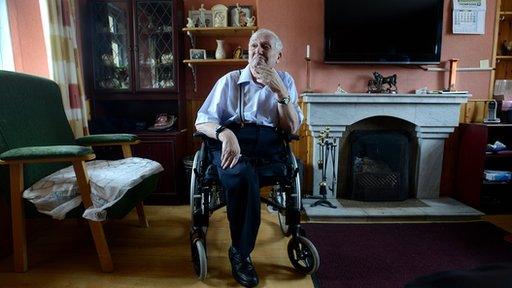Cleenish, County Fermanagh: World War One soldiers' island
- Published
Chris Buckler visited the island
Troops returning from the trenches of World War One were promised "Homes fit for heroes" by Prime Minister David Lloyd George.
One of the most extraordinary resettlement schemes was on an island in County Fermanagh.
Twelve homes were built on Cleenish Island on Upper Lough Erne to help those scarred by the horrors of the war settle back into civilian life.
Each of the 12 veterans was allocated 30 to 40 acres and a house, and left to survive off the land.
The island was only accessible by boat and there was no gas, no electricity, shops or other utilities.
Today, most of the stone houses lie abandoned and decaying amongst the fields of grazing cattle.
Why such a remote location was chosen is a mystery that local historians are hoping to unravel, helped by a £10,000 grant from the Heritage Lottery Fund.
Marion Maxwell, from Bellanaleck Local History Group, is hoping to record something of the experiences of the former soldiers, who set out to create new lives for themselves in such a remote and beautiful place.

Today, most of the stone houses lie abandoned and decaying
"While the land was very good, the rent was set very high and they had great difficulty getting on and off the island," she said.
By the time a bridge was finally built in the 1950s, most of the ex-soldiers had left for good.
Johnny Balfour was the only one who survived the hardships of island life.
He lived on Cleenish Island until he was 101 and his son and daughter are now its sole inhabitants.
Bella Balfour, who is 79, remembers it as a great place to grow up.
"The Army had land here and they shared it out among them, gave it to daddy, he got this place here," she said.
"He stayed in it, worked hard and reared us."
Her 84-year-old brother, Sammy Balfour, shared the happy memories of the land their father made his own.
"A bit of land long ago was as precious as the sun rising," he said.
Some of the soldiers bore the physical and psychological scars of their experiences in the war and Marion Maxwell is hoping to find out more about what happened to them.
"It may have been very soothing for them, or possibly the loneliness of it might have been a disadvantage to them. That's the kind of thing we're very keen to try to know more about," she said.

Sammy Balfour and his sister Bella are the island's only remaining inhabitants
She is hoping to trace descendants of the veterans to help them rediscover their forgotten stories.
Paul Mullan, head of the Heritage Lottery Fund in Northern Ireland, added: "We have funded many projects relating to the first world war, as we mark its centenary.
"This one is intriguing and fascinating. We're really looking forward to finding out what Marion and her team uncover."